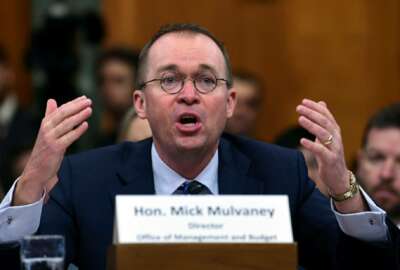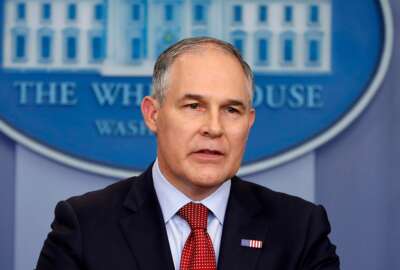
EPA ethics probe by OMB could put Pruitt in the hot seat
Office of Management Director Mick Mulvaney told House lawmakers that his agency would conduct an ethics probe into spending at the Environmental Protection Agency.
Office of Management and Budget Director Mick Mulvaney told House lawmakers this week that his agency would conduct an ethics probe into spending at the Environmental Protection Agency.
Mulvaney told members of the House Appropriations Committee that OMB would investigate after the Government Accountability Office ruled April 16 that the EPA violated federal spending laws when officials spent more than $43,000 on a soundproof “privacy booth” in Administrator Scott Pruitt’s office.
“We’re going to be completely above board on this one,” Mulvaney told the committee on Wednesday. “I’m not any happier about it than you are.”
GAO found the EPA failed to notify the House and Senate Appropriations Committees about spending on the booth. Political appointees, under a 2017 spending law, are required to report spending above $5,000 for office upgrades.
The governmentwide watchdog also determined that EPA violated the Antideficiency Act, which forbids agencies from spending money beyond what lawmakers have appropriated.
“We take the Anti-Deficiency Statute very, very seriously, and if they’ve been broken, we’ll follow the rules — we’ll follow the law, and we’ll do so in a transparent fashion,” Mulvaney said.
The Antideficiency Act falls under criminal law, but no one has been charged criminally for violating the statute. Mulvaney told lawmakers he would consult with OMB’s legal staff to determine the next “appropriate, statutory steps.”
Norm Eisen, the former White House special counsel for ethics and government reform, expressed doubt that Mulvaney would recommend Pruitt’s ouster, but said the investigation could still lead to Pruitt’s resignation.
“There are penalties for violating the Anti-Deficiency Act, but that would need to be triggered from within the administration. I think what is going to happen is not those penalties, but rather this whole pattern of conduct is eventually going to become so unsustainable that Pruitt will have to go,” Eisen told Federal News Radio in an interview Friday.
Charles Tiefer, a law professor at the University of Baltimore, says OMB’s ethics probe at the EPA could have more leverage than GAO’s legal opinion.
The GAO serves a watchdog function when it conducts an investigation and issues legal opinions, but doesn’t have the power to enforce its recommendations.
“The watchdog barks when it finds trouble, and so they barked,” Tiefer said in an interview Friday.
OMB, on the other hand, controls the flow of money from congressional appropriations to federal agencies.
“If a condition’s been put down by OMB, it has to be obeyed. They’re the source of the money. The appropriations flow through them,” he said.
Because the OMB director serves as a close adviser to the president, Tiefer said the agency’s investigation could put pressure on President Donald Trump to fire Pruitt.
“If there’s anybody who’s going to go to the president and say, ‘This guy has gone too far, we’ve got to get rid of him. Or we’ve got to put him on notice that if he makes one more slip-up, he’s gone,’ it’s going to be the OMB director,” Tiefer said.
As evident by Wednesday’s hearing, Mulvaney is also one of the highest presidential advisers that answers to lawmakers.
“If Mulvaney says he’s going to weigh in there, he’s saying that as the highest-level official who responds to Congress, and who can be told, ‘Come back,’ or ‘We’re going to remember this the next time we see you,” Tiefer said.
The GAO and OMB investigations mark a new layer of scrutiny of Pruitt’s actions as the head of the EPA, and join in a long list of pending investigations from congressional committees and the agency’s inspector general.
The investigations range from Pruitt’s rental of a Washington, D.C. condo from the wife of an energy lobbyist, to significant bonuses awarded to political appointee staffers, to flying first-class for official travel.
“An individual infraction by itself would simply be one black mark against [Pruitt]. But in a context in which a number of black marks are being accumulated, he loses his effectiveness when he seeks next year’s appropriations for his agency,” Tiefer said.
OMB is also looking into the purchase of a $31,000 dining set for Housing and Urban Development Secretary Ben Carson’s office. Mulvaney said the order didn’t violate the Antideficiency Act because HUD canceled the order.
Rep. Mike Quigley (D-Ill.), the co-chair of the Congressional Transparency Caucus, asked Mulvaney whether OMB should’ve flagged the EPA and HUD’s big-ticket purchases.
“They don’t seem to be episodes standing in isolation,” Quigley said. “What role does OMB play in overseeing these functions?”
Mulvaney agreed both agencies spent a “large sum of money,” but told Quigley that the transactions didn’t “rise to the level of sharing with the Office of Management and Budget.”
“We don’t micromanage every particular expenditure at every particular agency. We are involved in the appropriations process and the apportionment process and so forth, but it would not surprise me that something like this could happen at HUD or EPA without us knowing about it,” Mulvaney said.
Next Thursday, April 26, Pruitt will testify before the House Energy and Commerce Committee to discuss the Trump administration’s fiscal 2019 budget proposal.
However, Tiefer said lawmakers will likely use the hearing to grill Pruitt about the pending investigations, or may even flex their appropriations power to limit his spending power at the EPA.
“They can put down restrictions that say ‘no funds shall be spent for furnishings or first-class travel,’ or require the EPA’s chief financial officer to sign off on spending for the administrator’s office,” Tiefer said, adding that such a move would be unlikely.
In the 2018 omnibus spending bill Congress passed in March, lawmakers blocked funding needed to close regional EPA offices and restructure the agency.
The EPA did not return comment for this story.
Copyright © 2024 Federal News Network. All rights reserved. This website is not intended for users located within the European Economic Area.
Jory Heckman is a reporter at Federal News Network covering U.S. Postal Service, IRS, big data and technology issues.
Follow @jheckmanWFED




